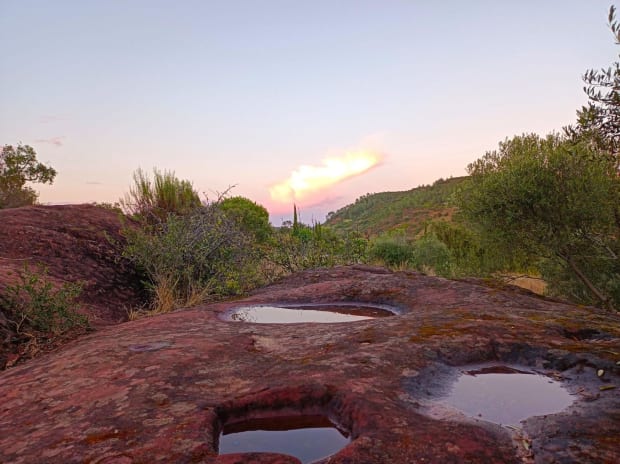A homesteader in Portugal shares her experiences running a farm, feeding her family and supporting a Bitcoin community through workshops.
In the conversation for this article, Julia joined me from her home in Southern Portugal to chat about her homestead, local community and Bitcoin. I found many parallels between how Julia talks about Bitcoin and homesteading with what I have heard from many homesteaders and farmers in the U.S. during my trip across the country this summer. The work to understand and work on Bitcoin or a farm demand high upfront investment and very low time preference.
In my conversation with Julia, we touched on her backstory as a German who moved her life to Portugal, the growth of the Bitcoin meetup in her local community and what it takes to operate a homestead that feeds her family.
Julia’s Backstory
Sidd: Let’s start with a bit of your backstory. Tell me about how you ended up in Portugal. Why did you move there and why did you stay?
Julia: I’m originally from Germany, and coming to Portugal was really just a part of something that happens to you when you’re in your late teens or early 20s. I first set foot on Portuguese terrain when I was 19 — I wanted to travel, so I looked around for some jobs. I found an opportunity to work in Portugal for three months, and I thought I would travel on to some other country after. But then, as life happens, I got offered a full-time job and I thought, “Yes, I’m going to resettle here in Portugal.”
Since then, my parents moved over together with my brothers shortly after me. I’ve been back to Germany a few times to visit some family, but my close family is here. The last time I went to Germany was maybe 15 years ago! I don’t go back regularly.
Local Community And Meetups
Sidd: Tell me about the community that you’ve built there. When I chatted with your friend earlier, she mentioned a local market that began in 2020.
Julia: Our community has always been on the alternative side of things, but it was really COVID-19 that kicked this community and networking thing into gear. That’s when everybody thought, “It’s now or never to build a strong local community and economy.” And that’s when the alternative markets started happening. People were looking for their tribe, because it became so apparent that there is a tribe: you’re either on this side, or you’re on the other side. In a way, COVID-19 has been a real blessing for community building here because it helped us grow into a very strong, little, tight-knit community.
Sidd: Tell me about the alternative market. What’s sold there? Who is selling and who is buying?
Julia: The market group currently counts over 1,000 members, and is based on private land with expected attendance of several hundred people from the Algarve. The Algarve region in South Portugal spans only 200 kilometers by 50 (kilometers) or so, and comprises the wider community who goes to the market. The local community who are producing and selling most of the goods at the market are within about a half hour drive of the market.
Most of what is sold at the market are handicrafts, jewelry, homemade products, soaps, cosmetics, natural healing tinctures and so on, with some foods. All homemade items. It’s on private land so fewer regulations apply to what’s sold.
Sidd: How many Bitcoiners are there in the community? Is there a Bitcoin meetup?
Julia: I started to understand Bitcoin only at the beginning of last year. Since then, we’ve had this one individual in the community — I’ll call him Rick — who started educating people on Bitcoin. His girlfriend is also very much into creating networks and running events, so she hosts regular meetups. Before these events started, I didn’t know anybody who was into Bitcoin. Now, I see Bitcoiners everywhere because I’m in the group. The same thing happened to me with homeschooling. Before I started homeschooling, I never knew there was a homeschooling community. The moment I started doing it myself, suddenly, it’s everywhere.
Portugal in general is a great magnet for Bitcoiners as well because the government brings a very relaxed approach to it. At the moment, you don’t have to pay capital gains tax. The government is discussing a possible capital gains tax, but for now it would only apply if you sell less than 12 months after purchasing.
Julia’s Interest In Bitcoin
Sidd: So, tell me about your interest in Bitcoin. Where did it come from?
Julia: I had been hearing about Bitcoin for years, but it wasn’t until a video (which I can’t remember now!) triggered a particular interest that I really started investigating. It was really Rick who helped answer all my questions and foster my interest. Before I had someone to sit down with and ask my questions to, it was all very dodgy. Meeting Rick was my entrance to the Bitcoin rabbit hole.
I had questions about the energy use, and how bitcoins resist being copied with a click. I also sat down with Rick to talk about what decentralization actually means, and why it matters. When the philosophical stuff kicked in — like what does all of this mean for humanity — I really got hooked. I could see something so different for the future of humanity in this.
Sidd: Let’s go back to homesteading. What parallels, if any, do you see between homesteading and Bitcoin?
Julia: The ups and down. You have to just flow with the ups and downs, you will have good days and successful times and then it will go downhill again. You have to swallow that as well. It’s like when you lose your whole flock of chickens in one night to a predator, that’s that. You could then decide to give up and sell, or you just keep going. And I think also, speaking to the aspect of community, Bitcoin-only people are generally a very nice bunch. The same goes for farmers. They’re very down-to-earth people, which I like.
There’s also a long-term approach to success shared between those two communities. You can’t just create a successful farm in half a year. It’s almost generational. It takes years until the soil responds and improves. Years of diligent day-to-day work, I would say. No quick-fix solutions.
Overview Of The Homestead
Sidd: Tell me about your homestead. What are you producing?
Julia: It’s a small homestead, probably a couple of acres. It’s really a family home. I bought it as a ruin in 2000, so we’ve been here over 20 years. At first I started by planting a few trees, and had my first successes and failures. Planting trees sounds easy, but with the hot and dry Portuguese summers, it’s not.
I was immediately confronted with the realities of nature. However, I persevered as I’ve always been interested in the relationship between health and food. That inevitably brings you to growing your own food, because nothing else you can buy out there is high quality enough to keep you healthy.
It really kicked into gear when I had children. My daughter is almost 10 years old now, so about 10 years ago I got serious: I want my own eggs and my own milk. And that’s when I really started more and more homesteading and animal keeping. I’m very focused on animal production, without a lot of vegetable growing. The aim is to supply the family. And finally, after so many years, we’re there. We actually have a constant supply of raw milk and eggs. We also have some fruit trees, but I’m focusing on my chickens and my goats. We recently started with pigs who are great prolific providers. Having a freezer full of your own meat is also a very good feeling.
Sidd: Are you at a point now where you’re overproducing and selling or having to store all this food?
Julia: I can sell some excess now. In springtime during the high season for eggs, I’m very happy to sell eggs as well as a few liters of milk. We are turning the idea of the homestead into an educational one: we’re running workshops on homesteading once or twice a month, depending on the season as well.
For example, we did one in September on vegetable fermentation to preserve vegetables from the fall harvest over the winter. We are now integrating Bitcoin education into those workshops as well. We have a bit of a farm shop too, which is just a big shelf in the kitchen where people can buy seeds, the beef jerky I make and other products.
Labor, Scaling And Costs
Sidd: What labor is involved now in operating your homestead, and how does that change across the seasons?
Julia: I do it alone, and it’s well organized. If you’ve got your infrastructure nicely set into place, then it’s quite easy. However, you’re still there twice a day every day for feeding and for moving goats around in the pen. We practice a regenerative, holistic approach so we never keep the animals in one place. Sometimes, I need some help moving big structures, so I will ask somebody in the community to help. I’m usually out for at least an hour in the morning, and then another hour in the evening, just for the daily basics.
Seasonal works do exist. In the winter it’s wet, and there’s more to do in terms of fixing shelters and fences. The summer is our dormant season here; it’s too hot to do any extra work. Summers are about getting feed, water and shelter for the animals.
Sidd: How did you scale up your homestead? What did you start with and what did you add as you went on?
Julia: I started with chickens, then pretty quickly expanded the number of chickens and started with goats. As just one person, there is not all that much scaling you can do. What you can do is stack: integrate one thing with another. I couldn’t just suddenly run 20 goats, but I could integrate the goats with the pigs because that’s not all that much more. That adds just a little bit to my daily chores. My husband still goes to work and I am homeschooling the kids, so I need to keep the labor on the homestead under control.
I’m now at a point where I can supply the family with milk and eggs to what we need and have that little bit of extra which pays for the animals’ feed, and that’s kind of a sweet spot to be in. I don’t see myself growing a lot at the moment. I might be able to buy another piece of land in the future and restructure some stuff. Possibly get a dairy cow instead of the goats, and maybe a beef cow instead of the pigs. We’ll see.
Sidd: Speaking of the feed, what costs are involved with the homestead that you’re running?
Julia: The cost of feed here over the course of the last 12 months has almost doubled. I do have to buy grain for the animals, even though they are out on pasture and occasionally getting kitchen leftovers. Other than that, we’re very lightweight on costs. Structures like small shelters are often self-made with whatever I can find. The only other significant cost is in electric fencing. I have very low vet costs because I keep my animals very clean and healthy. I don’t do the whole deworming and all that because I believe a healthy animal doesn’t have worms. In that way, we’re quite low on costs.
Mistakes And Advice
Sidd: What major mistakes have you made on your homesteading journey?
Julia: I think I wasted a lot of energy before I got to a true understanding of the land. That true understanding of the land came in 2015 when I did an extensive permaculture course online from Geoff Lawton. His course just put everything into place. Suddenly I knew how to harvest my water and where to put trees so they actually survive. I would recommend anyone starting a homestead to do one of those comprehensive training courses with a good teacher like Geoff or Allan Savory. Allan gave me a great understanding of how animals work in harmony with the ground and vegetation on the land.
Sidd: Knowing what you know now, where would you have started with homesteading? Would you have done it the same way that you did it or would you have started differently?
Julia: I think I took a fairly straightforward approach. There will always be a learning curve with mistakes and losses. I think for somebody just starting out, it’s smart to begin with small animals. You can’t run a cattle ranch with 100 heads overnight; you really have to grow into it in order to integrate your land and animals effectively. You have to be connected to your land and to your animals and the environment. You need to start small and feel your way.
Don’t try to integrate too many species. It’s all very romantic — them hopping around in the same pen — but in reality, it usually doesn’t work. They will either kill each other or eat each other’s food. We’ve made all those mistakes. I thought I could just put some ducks with the chickens, but the ducks killed my chicks. Those are things you don’t know until you try and see for yourself.
Definitely read books, but really see if what you read in those books makes sense for you. People can get so lost wanting to grow their own food and be self-sustainable, yet having no idea what it takes. Growing your own vegetables is tough! They are so sensitive, they will die on you with any number of tiny mistakes and everything wants to eat them. So make sure you keep enough money in your back pocket to support you, and don’t count on your food production.
Sidd: Thanks for joining me today and sharing all your knowledge and experiences gained through your homestead. How can people find you?
Julia: They can check out the Facebook page for our homestead, Terra Robinia, where we share some tips and event details for our workshops.
Sidd: Thank you Julia!
This is a guest post by Captain Sidd. Opinions expressed are entirely their own and do not necessarily reflect those of BTC Inc or Bitcoin Magazine.





 BTC-USD
BTC-USD  ETH-USD
ETH-USD  LTC-USD
LTC-USD  XRP-USD
XRP-USD